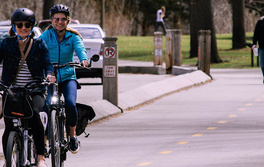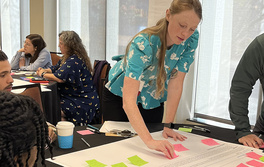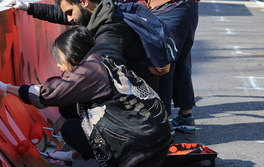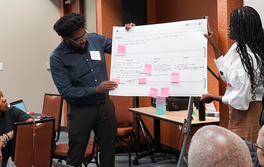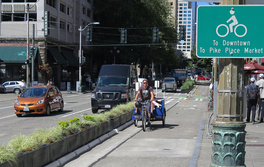
REPORT: Arrested Mobility – Barriers to Walking, Biking and E-Scooter Use in Black Communities in the U.S.
RELEASE: Arrested Mobility – Barriers to Walking, Biking and E-Scooter Use in Black Communities in the U.S.
Landmark Report Surveys Local U.S. Laws That Limit Black Communities’ Mobility and Access to Opportunity
(March 28, 2023) — Today marks the launch of Arrested Mobility: Barriers to Walking, Biking, and E-Scooter Use in Black Communities in the United States, a landmark report from Equitable Cities that surveys transportation-related policies and practices across all 50 states and 100 of the largest U.S. cities that limit mobility, access and opportunity for Black communities.
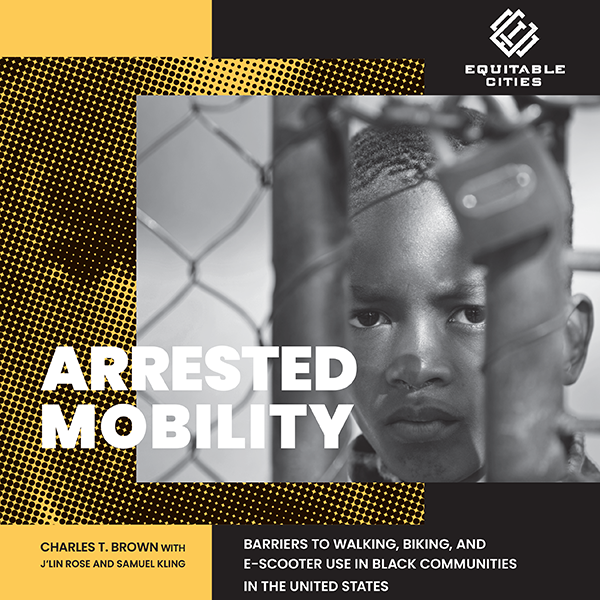
Mobility plays a fundamental role in connecting urban, suburban and rural residents alike to economic opportunities and daily needs. Yet for Black people and others of color in the U.S., moving and existing in public space increases the likelihood of experiencing profound obstacles that reflect structural racism in policy, planning, design and infrastructure and law enforcement.
The Arrested Mobility Report provides a starting point for understanding the state of mobility and access for Black Americans, as well as how to enact change.
In the report, authors Charles T. Brown (founder and CEO of Equitable Cities, and host of the Arrested Mobility Podcast), J’Lin Rose (policy analyst, Equitable Cities) and Samuel Kling (fellow and director of global cities research at the Chicago Council on Global Affairs) examine local transportation and public space laws that enable racially discriminatory policing of Black pedestrians bicyclists and e-scooter riders, and that result in adverse social, political, economic, environmental and health inequalities.
"Transportation is a fundamental aspect of daily life, but for Black Americans and other people of color, simply getting from point A to point B can be an uphill battle," said Charles T. Brown. "Structural racism and white supremacy have created a landscape where walking, biking, and even riding an e-scooter can present obstacles and dangers that are often invisible to those not directly impacted. It's time for us to acknowledge these barriers and work towards a transportation system that is truly equitable and accessible for all."
The report came about as a result of a collaboration between Equitable Cities and the New Urban Mobility alliance (NUMO). "This report highlights the many laws and regulations on the books that create a tangible and unequal power dynamic that puts Black and Brown people at risk by simply being in public space," said NUMO director Harriet Tregoning. "Whether or not these ordinances were adopted to intentionally and systematically exclude and oppress, their dangerous and discriminatory impacts are the same."
Arrested Mobility: Barriers to Walking, Biking, and E-Scooter Use in Black Communities in the United States is available here.
Equitable Cities is an urban planning, public policy and research firm working at the intersection of transportation, health and equity. Equitable Cities is committed to designing and implementing urban planning strategies that promote social justice and equity, and works collaboratively with communities, businesses and government entities to create sustainable, accessible and inclusive cities that provide all residents with the opportunities and resources necessary to thrive. Learn more at www.equitablecities.com.
NUMO is a global alliance that channels tech-based disruptions in urban transport to create joyful cities where sustainable and just mobility is the new normal. Founded in 2019 as an outgrowth of the Shared Mobility Principles for Livable Cities, NUMO convenes diverse allies and leverages the momentum of significant revolutions in mobility to target urban issues — including equity, sustainability, accessibility and labor — impacted by the shifting transportation landscape. NUMO is hosted by WRI Ross Center for Sustainable Cities. For more information, visit www.numo.global
